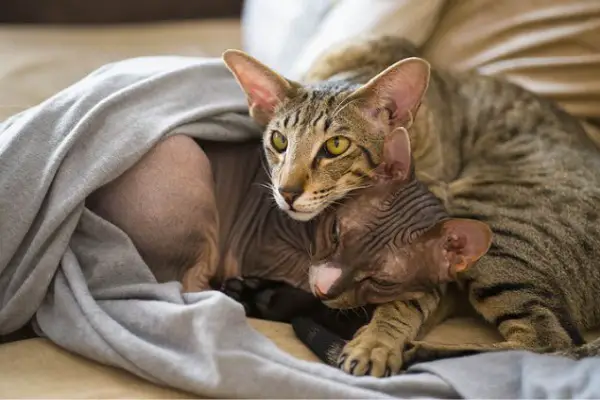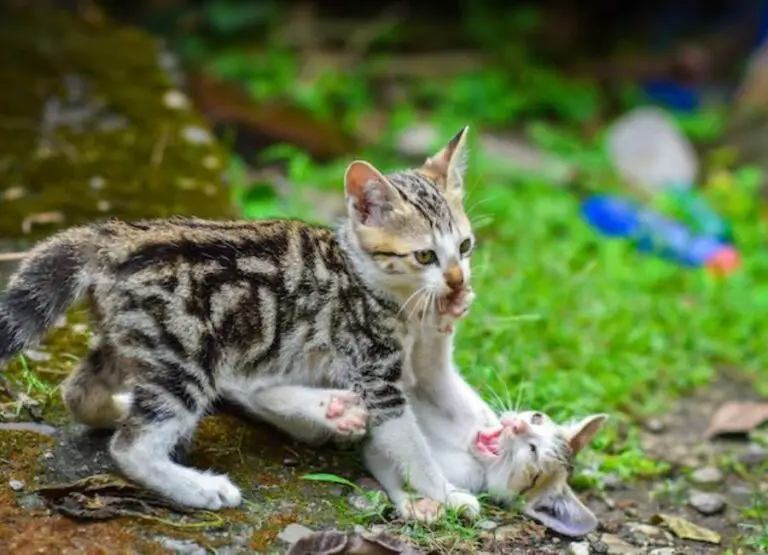Why Is My Cat So Aggressive Lately [See 9 Reasons]
![Why Is My Cat So Aggressive Lately [See 9 Reasons] Why Is My Cat So Aggressive Lately](https://petcreeks.com/wp-content/uploads/2023/10/cat-7201639_640.jpg)
Why is my cat so aggressive lately? Let’s find out together…
Have you noticed a sudden spike in your furry friend’s aggressive behavior? Wondering why your usually calm and cuddly cat has turned into a hissing ball of fury?
Well, fret not, because in this blog post, we’re diving deep into the mystery of why your cat might be acting so aggressively lately.
So, get cozy, and let’s uncover the secrets behind your feisty feline’s behavior!
Why Is My Cat So Aggressive Lately
Sudden aggression in cats can be caused by underlying pain or discomfort, stress, changes in their environment, fear or anxiety, territorial issues, or redirected aggression.
It is important to rule out any potential medical issues by consulting with a veterinarian.
Observing your cat’s behavior and providing a safe and enriched environment may help identify triggers and reduce aggression.
Let’s break it down further…
Reasons For Sudden Aggression in Cats
Here are some of the most common reasons for sudden aggression in cats:
1. Pain or Discomfort
Cats are masters at hiding their discomfort, but just like any creature, they can become irritable when they’re not feeling well.
Pain from an injury, arthritis, dental issues, or an underlying health problem can cause a normally placid cat to lash out. It’s their way of communicating that something’s not right.
Monitoring your cat’s behavior and consulting with a veterinarian to identify and address any sources of pain or discomfort is crucial in managing sudden aggression.
2. Hormonal Changes
Unspayed female cats can experience behavioral changes during their heat cycles, which can lead to increased aggression.
Unneutered male cats, driven by their natural instincts, may become more aggressive when seeking a mate.
Neutering and spaying can help reduce hormonal-driven aggression and provide a calmer environment for your feline companion.
It’s also essential to keep in mind that hormonal changes can also occur in older cats, impacting their behavior and potentially leading to sudden aggressive outbursts.
3. Cognitive Decline
As cats age, they may experience cognitive decline, similar to dementia in humans. This can lead to disorientation, confusion, and anxiety, which might manifest as aggression.
Changes in routine or environment can also be particularly distressing for older cats, contributing to their behavioral shifts.
Providing a comforting and predictable environment, along with enriching activities, can help alleviate stress and reduce the likelihood of sudden aggressive behavior in senior cats.
4. Lack of Stimulation
When it comes to sudden aggression in cats, lack of stimulation can be a significant factor.
Cats, like many animals, need mental and physical stimulation to stay happy and healthy.
Without proper stimulation, they can become bored, frustrated, and even aggressive.
Providing environmental enrichment, such as interactive toys, scratching posts, and regular playtime, can help prevent this kind of behavior in cats.
5. Overstimulation
On the flip side, overstimulation can also lead to sudden aggression in cats. Cats have a threshold for how much interaction and stimulation they can handle before becoming overwhelmed.
When they reach this point, they may lash out in aggression.
It’s important for cat owners to recognize their pet’s body language and signs of overstimulation, such as dilated pupils, flattened ears, and a twitching tail, and give them space when needed.
6. Frustration
Frustration can manifest as sudden aggression in cats.
This frustration can stem from various sources, such as an inability to access a desired space, lack of resources like food or water, or even changes in their environment.
Understanding and addressing the source of frustration can help mitigate aggressive behavior in cats.
Providing a consistent routine, ample resources, and a safe, comfortable environment can help reduce frustration and prevent sudden aggression in cats.
7. Repeat of Previous Trauma
Cats, like humans, can be deeply affected by traumatic experiences. When a cat experiences a traumatic event, such as abuse, a frightening encounter with another animal, or a painful medical procedure, it can leave a lasting impact.
If a cat encounters a situation or stimulus that reminds them of the past trauma, it can trigger defensive or aggressive behavior.
This is often a protective response, as the cat may perceive the current situation as a threat to their safety based on their past experiences.
Understanding a cat’s history and being sensitive to potential triggers can help mitigate the risk of sudden aggression stemming from repeat trauma.
8. Environmental Changes
Cats are creatures of habit and thrive in stable, predictable environments.
Significant changes in their surroundings, such as moving to a new home, introducing new pets, or rearranging furniture, can disrupt their sense of security and routine.
This disruption can lead to stress and anxiety, which may manifest as sudden aggression.
Cats rely on familiarity and routine to feel secure, and when their environment undergoes significant changes, they may feel threatened or vulnerable.
Providing a gradual transition, creating safe spaces, and maintaining comforting routines can help cats adapt to environmental changes and reduce the likelihood of sudden aggression.
9. Fear or Anxiety
Fear and anxiety are common triggers for sudden aggression in cats. When cats feel threatened, scared, or anxious, they may respond with defensive or aggressive behavior as a means of self-preservation.
Various stimuli, such as loud noises, unfamiliar visitors, or confrontations with other animals, can evoke fear and trigger an aggressive response.
It’s vital to recognize signs of fear or anxiety in cats, including hiding, dilated pupils, flattened ears, and vocalizations, and to take steps to mitigate their stress.
Creating a calm, secure environment, providing hiding spots, and using pheromone diffusers or calming products can help alleviate anxiety and reduce the likelihood of sudden aggression in fearful cats.
How to Address Sudden Aggression in Cats
![Why Is My Cat So Aggressive Lately [See 9 Reasons] How to Address Sudden Aggression in Cats](https://petcreeks.com/wp-content/uploads/2023/12/pexels-yakup-polat-19370105.jpg)
So, sudden aggression in cats can be pretty unsettling, but there are some effective ways to address it. First off, it’s crucial to rule out any medical issues by taking your cat to the vet.
Once medical issues are ruled out, try to identify any triggers for the aggression, like changes in the environment or routine.
It’s important to give your cat space and avoid punishment, as it can worsen the aggression. Providing plenty of mental and physical stimulation through play and interactive toys can help redirect their energy.
Additionally, using pheromone diffusers or calming collars can promote a sense of security for your cat.
Finally, if the aggression persists, consulting with a professional animal behaviorist can provide tailored solutions to address the issue.
Remember, patience and understanding are key when dealing with sudden aggression in cats.
Learn more about cat behavior problems.
Frequently Asked Questions
Why is my cat suddenly acting aggressive?
Cats can display aggression for various reasons. Some common causes include stress, fear, pain, territorial issues, or even a medical condition. It’s important to observe your cat’s behavior closely and consult with a veterinarian to rule out any underlying health issues.
How can I determine if my cat’s aggression is due to a medical condition?
If your cat’s aggression seems out of character or is accompanied by other unusual symptoms, it’s best to schedule a visit to the vet. They can conduct a thorough examination and run necessary tests to rule out any underlying medical conditions that may be causing the aggression.
Is there anything I can do to help reduce my cat’s aggression?
Yes, there are several things you can try. Ensure your cat has a safe and stimulating environment. Provide plenty of toys, scratching posts, and perches to keep them mentally and physically engaged. Additionally, try to identify and eliminate any potential stressors in their environment. Consulting with a professional animal behaviorist can also provide valuable insights and guidance.
Can neutering or spaying help with aggression in cats?
Yes, neutering or spaying can often help reduce aggression in cats, especially if it is related to hormonal changes or territorial behavior. However, it may not eliminate aggression entirely, and it’s important to address any underlying causes as well.
Should I punish my cat for aggressive behavior?
No, punishing your cat for aggressive behavior is not recommended. It can create fear and worsen their aggression. Instead, focus on positive reinforcement training techniques, redirecting their attention to appropriate toys, and implementing behavior modification strategies recommended by professionals.
When should I seek professional help for my cat’s aggression?
If your cat’s aggression persists or escalates despite your efforts, it’s crucial to seek professional help. A veterinarian or certified animal behaviorist can assess your cat’s behavior, identify the underlying causes, and develop a tailored plan to address the aggression effectively.
Conclusion
So, if you find your cat displaying aggressive behavior lately, remember that there could be underlying reasons behind it. It’s important to observe and understand your feline friend’s needs, seek professional advice if necessary, and provide a safe and nurturing environment to help them feel secure and content. Together, we can build a stronger bond with our furry companions and ensure their well-being.






